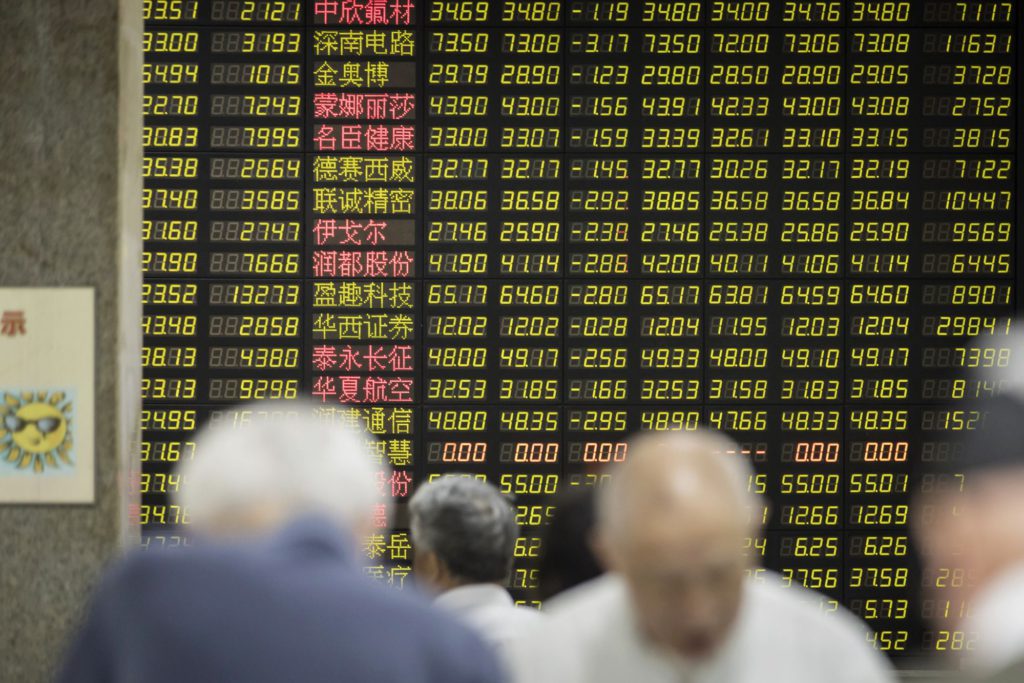(Bloomberg) — US stocks rose in a broad-based advance as investors assessed the outlook for corporate earnings and global growth amid Europe’s deepening energy crisis.
The S&P 500 climbed, with industrials, energy and financials leading all 11 industry groups higher. The broad rally was mirrored in the tech-heavy Nasdaq 100, as megacaps Apple Inc. and Alphabet Inc. bounced back from Monday’s losses ahead of Netflix Inc.’s earnings due later today. The dollar fell against its Group-of-10 peers.
With the potential for earnings disappointments baked into markets, any upside surprises may lead to outsized gains. Investors remain on high alert for signs that high inflation and monetary tightening are squeezing consumers and employment, and allocation to stocks plunged to levels last seen in October 2008, according to the latest Bank of America Corp.’s monthly fund manager survey.
“Earnings-vulnerability was strongly flagged in the run-up to the Q2 season, but this also seems to have lowered the bar, with some of the early reporting having been characterized as ‘better than feared,”’ said Ulrich Urbahn, head of multi-asset strategy and research at Berenberg.
Meanwhile, the euro rose to its highest level in about two weeks after Bloomberg News reported the European Central Bank may consider raising interest rates on Thursday by double the quarter-point outlined previously to counter worsening inflation.
Markets are pricing in about 38 basis points of tightening on Thursday, when the ECB is expected to raise rates for the first time in more than a decade. That reflects about a 50/50 chance of a 50-basis point increase. An outsized hike would put the ECB more in line with global peers moving up their policy rates at warp speed.
The ECB is under pressure to subdue inflation, but the potential for a Russian gas shutdown could plunge Europe into recession. The European Union is preparing to tell members to cut gas consumption “immediately” to preserve supplies for winter, according to a report.
European stocks could slump another 10% if Russia cuts off gas to the region, triggering a recession, according to Citigroup Inc. strategists. A halt of Russian gas supplies could potentially reduce the euro area’s gross domestic product by about 1%, which would imply a 10% contraction in European earnings-per-share over the next 12 months, according to Citi.
Oil slid, with West Texas Intermediate crude falling to about $100 a barrel, after posting the biggest one-day advance since May.
How far will the Fed go in this hiking cycle? It takes one minute to participate in the confidential MLIV Pulse survey, so please click here to get involved.
Key events to watch this week:
- Earnings this week include Netflix, Tesla
- US Treasury Secretary Janet Yellen visits South Korea. Tuesday
- Reserve Bank of Australia releases July minutes. Tuesday
- UK Chancellor Nadhim Zahawi and Bank of England Governor Andrew Bailey speak at event. Tuesday
- Bloomberg Crypto Summit in New York. Tuesday
- Bank of Japan, European Central Bank rate decisions. Thursday
- Nord Stream 1 pipeline scheduled to reopen following maintenance. Thursday
Some of the main moves in markets:
Stocks
- The S&P 500 rose 1% as of 9:49 a.m. New York time
- The Nasdaq 100 rose 0.9%
- The Dow Jones Industrial Average rose 0.8%
- The Stoxx Europe 600 rose 0.5%
- The MSCI World index rose 0.8%
Currencies
- The Bloomberg Dollar Spot Index fell 0.7%
- The euro rose 1% to $1.0249
- The British pound rose 0.6% to $1.2030
- The Japanese yen rose 0.4% to 137.59 per dollar
Bonds
- The yield on 10-year Treasuries declined one basis point to 2.98%
- Germany’s 10-year yield advanced four basis points to 1.25%
- Britain’s 10-year yield was little changed at 2.15%
Commodities
- West Texas Intermediate crude fell 1.1% to $101.48 a barrel
- Gold futures were little changed
More stories like this are available on bloomberg.com
©2022 Bloomberg L.P.











